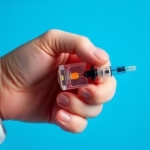So, you’re dealing with bacterial vaginosis (BV) and wondering if it’s safe to wear tampons? Let’s break it down for you!
First things first, BV is a common vaginal infection caused by an imbalance of bacteria in the vagina. It can lead to symptoms like unusual vaginal discharge, itching, and a strong fishy odor. Not the most pleasant experience, right?
Now, you might be wondering, “Can I still use tampons while dealing with BV?” Well, the short answer is yes, you can, but there are some risks you should be aware of.
Wearing tampons while having BV can potentially worsen the infection or disrupt the delicate balance of bacteria in your vagina. This could lead to increased discomfort, irritation, or even increase the risk of developing other infections. Yikes!
But don’t worry, there are ways to safely wear tampons while managing BV. It’s all about being mindful and taking some precautions to ensure your vaginal health is not compromised.
So, if you’re dealing with BV and still want to use tampons, stay tuned for some helpful tips on how to do so safely. We’ll share some expert advice on how to navigate this situation and keep your vaginal health in check!
Understanding BV and its Symptoms
Have you ever experienced an unusual odor or discharge down there? It could be a sign of bacterial vaginosis, commonly known as BV. BV is a common vaginal infection caused by an imbalance of bacteria in the vagina. While it’s not a sexually transmitted infection, it can still cause discomfort and embarrassment.
So, what are the symptoms of BV?
Well, the most common symptom of BV is a fishy odor that gets stronger after sex or during menstruation. You may also notice a thin, white or gray vaginal discharge that is different from your usual discharge. Some women with BV may experience itching or burning in the genital area.
If you’re experiencing any of these symptoms, it’s essential to see a healthcare provider for a proper diagnosis and treatment. Don’t ignore these signs as BV can lead to complications if left untreated.
Remember, BV is not the same as a yeast infection or a urinary tract infection, so it’s crucial to get the right diagnosis and treatment from a healthcare professional.
Now, you might be wondering, can I still wear tampons while dealing with BV? Well, let’s dive into that in the next section. Stay tuned for more tips and advice on managing BV while using tampons.
Risks of wearing tampons with BV
Hey there! Let’s talk about the risks of wearing tampons when you have bacterial vaginosis (BV). BV is a common vaginal infection caused by an imbalance of bacteria in the vagina. While it’s important to manage your symptoms, it’s also crucial to be aware of how tampons can potentially affect BV.
1. Prolonged use of tampons can disrupt the natural pH balance of the vagina:
Your vagina maintains a delicate balance of good and bad bacteria. When you have BV, this balance is already disrupted. Using tampons for extended periods can further disrupt this balance, making it harder for your body to fight off the infection. This can lead to more severe symptoms and longer recovery times.
2. Risk of increased irritation and discomfort:
Wearing tampons when you have BV can increase irritation and discomfort in the vaginal area. The chemicals and materials in tampons can aggravate the already sensitive tissues in the vagina, leading to more pain and discomfort. It’s essential to listen to your body and avoid anything that might exacerbate your symptoms.
3. Increased risk of toxic shock syndrome (TSS):
While rare, the risk of developing toxic shock syndrome (TSS) is higher when wearing tampons, especially with BV. TSS is a severe and potentially life-threatening condition caused by toxins produced by certain bacteria. Since BV already affects the bacterial balance in the vagina, using tampons can further increase the risk of TSS. It’s crucial to change your tampons regularly and follow proper hygiene practices to minimize this risk.
4. Delayed healing and recovery:
Continued use of tampons with BV can delay your body’s natural healing process. The infection may persist or worsen, leading to prolonged discomfort and symptoms. It’s important to give your body the best chance to recover by avoiding potential irritants like tampons and opting for safer alternatives.
Remember, everyone’s body is different, and what works for one person may not work for another. If you’re experiencing BV symptoms and considering using tampons, it’s best to consult with your healthcare provider for personalized advice. They can recommend the best course of action based on your individual situation and help you manage your symptoms effectively.
Stay informed, take care of your body, and prioritize your health. Your well-being is essential, so make choices that support your body’s natural healing process. Take care!
Tips for Safely Wearing Tampons with BV
Dealing with bacterial vaginosis (BV) can be uncomfortable, but it doesn’t mean you have to give up using tampons. With the right precautions and care, you can safely wear tampons while managing BV. Here are some tips to help you navigate this situation:
- Choose the Right Tampons: Opt for tampons made of organic cotton to reduce the risk of irritation. Avoid scented tampons as they can disrupt the delicate pH balance of your vagina, making BV symptoms worse.
- Change Tampons Regularly: Be diligent about changing your tampon every 4-8 hours, even on lighter flow days. This helps prevent the build-up of bacteria and reduces the risk of exacerbating BV symptoms.
- Avoid Super Absorbent Tampons: Using super absorbent tampons can dry out your vaginal tissues, leading to irritation and potentially worsening BV symptoms. Stick to regular absorbency tampons.
- Practice Good Hygiene: Wash your hands before and after inserting a tampon to prevent the transfer of bacteria. Avoid using douches or harsh soaps, as they can disrupt the natural balance of your vagina.
- Avoid Tampons Overnight: Give your body a break from tampons while you sleep. Opt for pads or period underwear to allow your vagina to breathe and maintain a healthy pH balance.
- Stay Hydrated: Drinking plenty of water helps flush out toxins and bacteria from your body, promoting overall vaginal health and reducing the risk of BV flare-ups.
Remember, it’s essential to listen to your body and pay attention to any changes in your BV symptoms while using tampons. If you experience increased discomfort, unusual discharge, or persistent odor, consult your healthcare provider for further guidance.
By following these tips and being mindful of your vaginal health, you can effectively manage BV while using tampons. Don’t let BV hold you back from living your life to the fullest!
Alternatives to tampons for managing BV
So, you’ve been dealing with BV and wondering if there are alternatives to using tampons during this time? Well, you’re in luck because I’m here to share some helpful options with you! While tampons can sometimes worsen the symptoms of BV due to their absorbent nature, there are other products that can provide relief and comfort while managing the infection.
1. Pads
One of the most common alternatives to tampons is using pads. Pads are external sanitary products that can be worn in your underwear to absorb menstrual blood. They are non-invasive and don’t interfere with the natural pH balance of your vagina, making them a great choice for those with BV. Make sure to change your pad regularly to prevent any bacterial growth.
2. Menstrual cups
Menstrual cups are another popular alternative to tampons. These reusable silicone cups are inserted into the vagina to collect menstrual blood. Unlike tampons, menstrual cups do not absorb any fluids, which can help maintain the natural balance of your vaginal flora. They are eco-friendly, cost-effective, and can be worn for up to 12 hours at a time.
3. Period panties
If you’re looking for a comfortable and hassle-free alternative to tampons, period panties are a great option. These specially designed underwear have built-in absorbent layers that can hold up to two tampons’ worth of menstrual flow. Period panties are washable and reusable, making them an eco-friendly choice for managing your period while dealing with BV.
4. Organic cotton tampons
If you prefer to stick with tampons but want a safer option for managing BV, consider switching to organic cotton tampons. These tampons are made from 100% organic cotton, free from harmful chemicals and synthetic materials that can irritate the vagina. Organic cotton tampons are gentle on sensitive skin and can help reduce the risk of exacerbating BV symptoms.
Remember, it’s essential to listen to your body and choose the menstrual products that work best for you. If you’re unsure about which alternative to tampons is right for you, don’t hesitate to consult with your healthcare provider for personalized advice.
Managing BV can be challenging, but with the right menstrual products and proper care, you can alleviate discomfort and promote vaginal health. Stay informed, stay healthy, and don’t be afraid to explore different options until you find what works best for you!
When to Seek Medical Advice for BV While Using Tampons:
1. If you experience persistent or worsening symptoms: If your BV symptoms do not improve or get worse while using tampons, it’s crucial to seek medical advice. This could indicate that the infection is not being adequately treated or that there may be another underlying issue.
2. If you develop additional symptoms: If you notice any new or concerning symptoms while using tampons with BV, such as unusual discharge, pelvic pain, fever, or a foul odor, it’s essential to consult a healthcare provider promptly. These could be signs of a more severe infection that requires medical attention.
3. If you have recurrent BV infections: If you frequently experience BV flare-ups while using tampons, it’s essential to talk to your healthcare provider. They can help determine the underlying causes of recurrent infections and recommend appropriate treatment options to manage and prevent future episodes.
4. If you are pregnant or breastfeeding: If you are pregnant or breastfeeding and have BV while using tampons, it’s crucial to seek medical advice. BV can increase the risk of complications during pregnancy, such as preterm birth or low birth weight, so it’s essential to have proper management and monitoring by a healthcare provider.
5. If you have a compromised immune system: If you have a weakened immune system due to conditions like HIV/AIDS, cancer, or undergoing immunosuppressive therapy, it’s vital to seek medical advice if you have BV while using tampons. Your healthcare provider can provide personalized guidance on managing the infection and reducing the risk of complications.
Remember, it’s always best to consult a healthcare professional if you have any concerns or questions about managing BV while using tampons. They can offer personalized advice and treatment recommendations based on your specific situation and medical history.
Take care of your vaginal health and prioritize your well-being by seeking medical advice when needed. Your healthcare provider is there to support you and ensure you receive the best care possible. Stay informed, stay proactive, and stay healthy!
Further Reading







